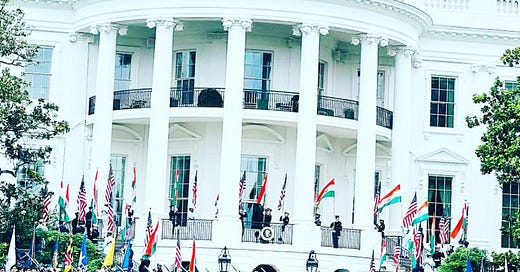An Ode to Cities of Blinding Lights
The blinding lights - and bright language - intrinsic to places like the United States and India can stir our spirit, but should also stir a search.
What happens, or rather should happen, to us when we’re confronted with the blinding lights of a world - and places - always on the sell?
What if, in addition to drawing initial inspiration from what the lights draw our attention to, we also resolved to illuminate and find inspiration in what was unlit?
In U2’s 2004 track “City of Blinding Lights,” frontman Bono sings:
The more you see, the less you know
The less you find out as you go
I knew much more then
Than I do now
Neon-heart, day-glow eyes
A city lit by fireflies
They’re advertising in the skies
For people like us
And I miss you when you’re not around
I’m getting ready to leave the ground
Oh, you look so beautiful tonight
In the city of blinding lights”
Humans, since time immemorial, have long been drawn to bright lights - of stars, of fires, of cities. But also the bright “lights” of conflict, of caricature, of calamity. Sometimes our draw to the light fulfills… often, it does not.
Bono sings about both sides of this coin: “Oh, you look so beautiful” and “the more you see, the less you know.”
But what might it take for U2’s lyric to read more aspirationally? What if it read “the more you see, the more you know?”
There is one path: when we leave our comfort zones to look past the blinding lights - of cities, of countries and of communities of all kinds - we begin to transcend our most superficial senses, and then ultimately serve our deeper senses of understanding and humanity.
India, which celebrated 76 years of independence this week, presents one of the world’s most compelling settings in which to traverse this journey from partial sight of place to total awareness in place.
To visit, live in and observe India is to experience a nation bursting with lights … lights that delight but also lights that can blind. “Sensory overload” is a common refrain from those who’ve just returned from a visit to the Indian subcontinent. But there’s a different type of light at play in places like India as well: that of language.
Bright, shiny language like “the world’s digital hub” and “the world’s largest democracy” to “the world’s youngest, most populous country” and home of “the world’s largest elections” rings true, and undoubtedly elevates our sense of magic around the Indian landscape. Much of this language, and these lights, were on full display during Indian Prime Minister Modi’s visit to Washington D.C. this past June. But settling for and sitting only with these bright lights also dims our view of all else the place might teach and tell us in its details.
During my two stints in the subcontinent as an American expat, I credit the bright lights and language of India with helping create and cultivate in me a lifelong commitment to curiosity, consideration and creativity, all hallmarks of a humanistic sensibility I now seek to make accessible to many more.
Like many expats, while living in Delhi and later in Mumbai, I couldn’t stop asking, reading and expressing. Indeed, it took being overwhelmed by the blinding lights of a foreign subcontinent for me to awaken to a habit I had not fully developed earlier. It wasn’t until living in India, after a humanities education in my home country, that I began to fully grasp the power of an always-on humanistic spirit: that is, to travel more deeply below the surface of the human condition to where the light hasn’t yet reached, and then embrace the personal and professional growth that ensues.
It’s no surprise that my first, earnest attempt at social entrepreneurship - itself an exercise in deeply-felt curiosity, creativity and courage - occurred in India. And I’m far from the only one. It’s why many thoughtful voices, including Walter Russell Mead of the Hudson Institute, are now calling on young Americans to begin traveling to and learning in the unmatched Indian context.
My home country, the United States, bounds with lights and language as well. Our national founding and national aspirations consist of some of the highest-minded lyrical poetry in Western Civilization. “We hold these truths to be self-evident” and “We the people.”
As Americans, we recalled much of this light last month on the Fourth of July and will again in 2026 as our nation celebrates 250 years of independence. But it’s this very bold language - these bright lights - that have also proved indispensable to and inspired centuries of nation building in service of realizing a more perfect union.
That habit of mind, of seeing the light - but not settling too comfortably in its shine - and then being curious about and caring for the illumination of what remains unlit, is and can remain an individual and national superpower.
And so maybe that’s the superpower of the future: the ability to journey from seeing lights that blind to feeling the warmth - and wisdom - of those that bind… binding nations and binding us to our best selves.




